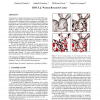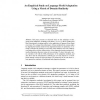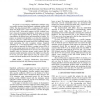873 search results - page 6 / 175 » Language model adaptation using Random Forests |
139
click to vote
SIGGRAPH
1998
ACM
15 years 6 months ago
1998
ACM
In this paper we introduce the Progressive Forest Split (PFS) representation, a new adaptive refinement scheme for storing and transmitting manifold triangular meshes in progress...
108
click to vote
IJCNLP
2005
Springer
15 years 8 months ago
2005
Springer
Abstract. This paper presents an empirical study on four techniques of language model adaptation, including a maximum a posteriori (MAP) method and three discriminative training mo...
105
click to vote
ICASSP
2010
IEEE
15 years 2 months ago
2010
IEEE
We present a novel language identification technique using our recently developed deep-structured conditional random fields (CRFs). The deep-structured CRF is a multi-layer CRF mo...
114
Voted
INTERSPEECH
2010
14 years 9 months ago
2010
This paper presents our latest efforts toward LVCSR systems for five Eastern European languages such as Bulgarian, Croatian, Czech, Polish, and Russian using our Rapid Language Ad...
119
click to vote
ICASSP
2008
IEEE
15 years 8 months ago
2008
IEEE
Language model (LM) adaptation is often achieved by combining a generic LM with a topic-specific model that is more relevant to the target document. Unlike previous work on unsup...



